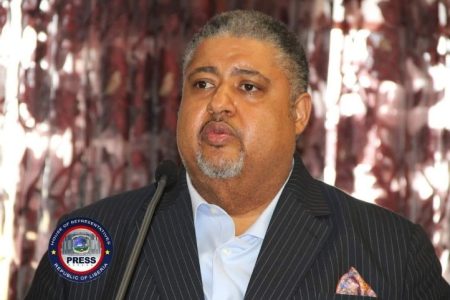–As Min. Modad makes case for Liberia at WIPO Assemblies
The Minister of Commerce and Industry, Amin Modad, has pleaded with the World Intellectual Property Organization (WIPO) for support to conduct a study quantifying the economic contribution of intellectual property to the economy and broader society.
In remarks at the WIPO 65th General Assemblies, which is taking place from July 9—17 in Geneva, Switzerland, Minister Modad noted that the administration of President Boakai sees intellectual property as a critical driver of economic growth and socioeconomic development.
“Looking ahead, Liberia seeks WIPO’s collaboration and support in digitizing and developing our intellectual property structure, prioritizing technology, and harnessing our rich culture—beginning with comprehensive studies to quantify their impact on our economy and the broader society,” Minister Modad said in his remarks at the opening of the WIPO Assemblies on July 9.
“Despite being a relatively new administration, we place a high priority on intellectual property as a catalyst for socioeconomic development,” Minister Modad maintained. “With a growing youth population and a dynamic women population, Liberia is cognizant of the opportunities intellectual property and technology provide in changing lives and fostering a sustainable development agenda vested in our people, culture, and traditions.”
According to Minister Modad, the government’s “trade priorities” rest on adding value to its comparative advantages; as such, the government has been diligently raising intellectual property awareness across the creative industries and the government.
He added that the Ministry of Commerce and Industry will ensure concrete actions across agencies regarding intellectual property and its mainstreaming in “our national development agenda”.
The minister’s remarks at WIPO, the world’s largest gathering on intellectual property matters, come as the government of Liberia (GOL), through the Liberia Intellectual Property Office (LIPO), makes strides in strengthening the Liberia intellectual property ecosystem amidst substantial challenges, which it has been working to address.
The government, among other priorities, has made the digitization of the intellectual property registration process and the conduct of a study quantifying the economic contribution of intellectual property to the economy and broader society key policy areas.
This has led to jubilation among the country’s intellectual property stakeholders, who have persistently found the costly and time-consuming paper-based registration frustrating.
The digitization of the registration process, according to stakeholders, will lead to the simplification and expedition of the application process, reducing filing costs as well as enabling them to track their applications conveniently from anywhere.
Additionally, the proposed study, according to stakeholders, would address the age-old problem of the lack of data on the impact of intellectual property on Liberia’s GDP and employment generation, as well as painting a clear picture of the economic impact of infringements and the long-term value of the creative industry or the intellectual property ecosystem as a whole.
While intellectual property has been impacting the country positively, stakeholders believe that the lack of data makes it quite difficult for policymakers and the general public to clearly understand the socioeconomic impact of intellectual property on Liberia.
The study, when conducted, stakeholders argued, will play a crucial role in guiding the drafting of the country’s next National Intellectual Property Policy and Strategy, which will be anchored on data—that would easily lead to the harnessing of the country’s intellectual property potential.
Minister Modad, at the ongoing WIPO Assemblies, informed the body of the government’s commitment to submit all outstanding WIPO and ARIPO protocols for ratification in the months ahead.
Minister Modad noted further that while Liberia acknowledged its limitations, “it is also eager and committed to cooperate with WIPO and member states” to collectively transition towards a knowledge-based global economy driven by intellectual property.
“Honorable Chair, Liberia aligns itself with the African position and expresses gratitude to WIPO for its unwavering support to our SMEs in the area of intellectual property management,” Minister Modad said. “For example, 30 SMEs in fields such as food processing and packaging and fashion design recently received training in IP management and business development.”
The Minister added that the government was proud to announce that some of the SMEs have successfully protected their trademarks, leading the government to establish a manufacturing association to further facilitate interactions between the government and SMEs on intellectual property rights.
Meanwhile, the ongoing WIPO Assemblies, which are being attended by some 1,400 delegates, including close to 20 Ministers, will, among other things, review the WIPO Secretariat’s work over the past year and determine future activities according to a strategic direction for WIPO approved by member states in 2022.
They will also convene to examine WIPO treaties, which form the backbone of the global IP ecosystem that supports innovators and creators around the world.
The Assemblies follow on a May 2024 Diplomatic Conference, where member states approved, by consensus, a new treaty related to IP and Indigenous Peoples, marking a multilateral advancement ahead of a second late-stage treaty negotiation scheduled for November in Riyadh, Saudi Arabia.
“The work of transforming the global IP ecosystem is beginning to show results, not just shaping global IP standards and gaining the attention of leaders but also reaching deeper to the ground, and touching the lives of more people than ever,” said WIPO Director General Daren Tang.
“So let us continue as one WIPO community to put in place the right practices, norms, standards, policies, and projects so that we can make IP part of the journey of every innovator and creator, and make IP a catalyst for growth and development for every country in the world,” he said.
Meanwhile, accompanying Minister Modad on this trip are Garmai Koboi and Clarence Cole, Director General and Deputy Director General for Copyright, respectively, at the Liberia Intellectual Property Office, and F. Alphonso Y. Belleh II, Chief of Staff to the Minister.


